Related Research Articles
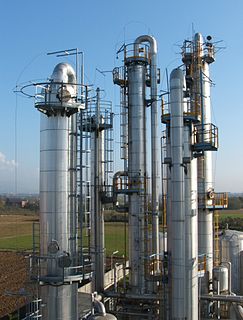
Chemical engineering is a certain type of engineering which deals with the study of operation and design of chemical plants as well as methods of improving production. Chemical engineers develop economical commercial processes to convert raw material into useful products. Chemical engineering uses principles of chemistry, physics, mathematics, biology, and economics to efficiently use, produce, design, transport and transform energy and materials. The work of chemical engineers can range from the utilization of nanotechnology and nanomaterial in the laboratory to large-scale industrial processes that convert chemicals, raw materials, living cells, microorganisms, and energy into useful forms and products. Chemical engineers are involved in many aspects of plant design and operation, including safety and hazard assessments, process design and analysis, modeling, control engineering, chemical reaction engineering, nuclear engineering, biological engineering, construction specification, and operating instructions.
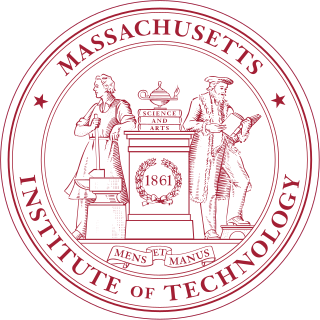
The Massachusetts Institute of Technology (MIT) is a private land-grant research university in Cambridge, Massachusetts. Established in 1861, MIT has since played a key role in the development of modern technology and science, ranking it among the top academic institutions in the world.

Herbert Wayne "Herb" Boyer is an American Biotechnologist, researcher and entrepreneur in biotechnology. Along with Stanley N. Cohen and Paul Berg he discovered a method to coax bacteria into producing foreign proteins, thereby jump starting the field of genetic engineering. By 1969, he performed studies on a couple of restriction enzymes of the E.coli bacterium with especially useful properties. He is recipient of the 1990 National Medal of Science, co-recipient of the 1996 Lemelson–MIT Prize, and a co-founder of Genentech. He was professor at the University of California, San Francisco (UCSF) and later served as vice president of Genentech from 1976 until his retirement in 1991.
Arthur D. Little is an international management consulting firm originally headquartered in Boston, Massachusetts, United States, founded in 1886 and formally incorporated in 1909 by Arthur Dehon Little, an MIT chemist who had discovered acetate. Arthur D. Little pioneered the concept of contracted professional services. The company played key roles in the development of business strategy, operations research, the word processor, the first synthetic penicillin, LexisNexis, SABRE, and NASDAQ. Today the company is a multinational management consulting firm operating as a partnership.

Robert Samuel Langer, Jr. FREng is an American chemical engineer, scientist, entrepreneur, inventor and one of the twelve Institute Professors at the Massachusetts Institute of Technology.

Biological engineering or bioengineering is the application of principles of biology and the tools of engineering to create usable, tangible, economically-viable products. Biological engineering employs knowledge and expertise from a number of pure and applied sciences, such as mass and heat transfer, kinetics, biocatalysts, biomechanics, bioinformatics, separation and purification processes, bioreactor design, surface science, fluid mechanics, thermodynamics, and polymer science. It is used in the design of medical devices, diagnostic equipment, biocompatible materials, renewable energy, ecological engineering, agricultural engineering, process engineering and catalysis, and other areas that improve the living standards of societies.

George Nicholas Hatsopoulos was a Greek American mechanical engineer noted for his work in thermodynamics and for having co-founded Thermo Electron.
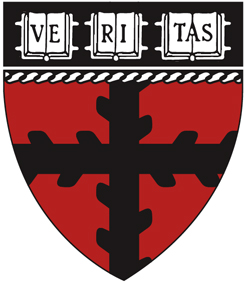
The Harvard John A. Paulson School of Engineering and Applied Sciences (SEAS) is the engineering school within Harvard University's Faculty of Arts and Sciences, offering degrees in engineering and applied sciences to graduate students admitted directly to SEAS, and to undergraduates admitted first to Harvard College. Previously the Lawrence Scientific School and then the Division of Engineering and Applied Sciences, the Paulson School assumed its current structure in 2007. Francis J. Doyle III has been its dean since 2015.

Galen D. Stucky is an American inorganic materials chemist who is a Distinguished Professor and the Essam Khashoggi Chair In Materials Chemistry at the University of California, Santa Barbara. He is noted for his work with porous ordered mesoporous materials such as SBA-15. He won the Prince of Asturias Award in 2014, in the Scientific and Technological Research area. Stucky was elected a member of the American Association for the Advancement of Science in 1994, a member of the American Academy of Arts and Sciences in 2005, and a member of the National Academy of Sciences in 2013.
William Hultz Walker was an American chemist and professor. He was born in Pittsburgh, Pennsylvania, and graduated in 1890 at Penn State College and took his Ph.D. at Göttingen (1892). In 1894 he accepted the chair of industrial chemistry at the Massachusetts Institute of Technology, where from 1908 he was also director of the research laboratory of applied chemistry. Walker was vice president of the International Congress of Applied Chemistry in 1893 and president of the American Electrochemical Society in 1910. The New York Section of the American Chemical Society conferred on him its Nichols medal in 1908.

Nicholas (Nikolaos) A. Peppas is a chemical and biomedical engineer whose leadership in biomaterials science and engineering, drug delivery, bionanotechnology, pharmaceutical sciences, chemical and polymer engineering has provided seminal foundations based on the physics and mathematical theories of nanoscale, macromolecular processes and drug/protein transport and has led to numerous biomedical products or devices.
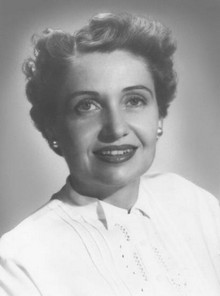
Margaret Hutchinson Rousseau was an American chemical engineer who designed the first commercial penicillin production plant. She was the first female member of the American Institute of Chemical Engineers.

Stephen James Lippard is the Arthur Amos Noyes Emeritus Professor of Chemistry at the Massachusetts Institute of Technology. He is considered one of the founders of bioinorganic chemistry, studying the interactions of nonliving substances such as metals with biological systems. He is also considered a founder of metalloneurochemistry, the study of metal ions and their effects in the brain and nervous system. He has done pioneering work in understanding protein structure and synthesis, the enzymatic functions of methane monooxygenase (MMO), and the mechanisms of cisplatin anticancer drugs. His work has applications for the treatment of cancer, for bioremediation of the environment, and for the development of synthetic methanol-based fuels.
Adam Ezra Cohen is a Professor of Chemistry, Chemical Biology, and Physics at Harvard University. He has received the Presidential Early Career Award for Scientists and Engineers and been selected by MIT Technology Review to the TR35 list of the world's top innovators under 35.

Massachusetts Institute of Technology's intercollegiate sports teams, called the MIT Engineers, compete mostly in NCAA Division III. It has won 22 Team National Championships, 42 Individual National Championships. MIT is the all-time Division III leader in producing Academic All-Americas (302) and rank second across all NCAA Divisions. MIT Athletes won 13 Elite 90 awards and ranks first among NCAA Division III programs, and third among all divisions. Most of the school's sports compete in the New England Women's and Men's Athletic Conference (NEWMAC), with sports not sponsored by the NEWMAC housed in several other conferences. Men's volleyball competes in the single-sport United Volleyball Conference. One MIT sport, women's rowing, competes in Division I in the Eastern Association of Women's Rowing Colleges (EAWRC). Men's water polo, a sport in which the NCAA holds a single national championship for all three of its divisions, competes in the Collegiate Water Polo Association (CWPA) alongside Division I and Division II members. Three sports compete outside NCAA governance: men's rowing competes in the Eastern Association of Rowing Colleges (EARC), sailing in the New England Intercollegiate Sailing Association of ICSA and squash in the College Squash Association. In April 2009, budget cuts led to MIT's eliminating eight of its 41 sports, including the mixed men's and women's teams in alpine skiing and pistol; separate teams for men and women in ice hockey and gymnastics; and men's programs in golf and wrestling.

Edward Wilson Merrill was an American biomaterials scientist. He was one of the founders of bioengineering, and specifically the biomedical engineering field it developed from chemical engineering. Merrill was born to Edward Clifton Merrill (1881–1949), a chemical engineer and chief chemist of the United Drug Company (Rexall) and Gertrude Wilson (1895–1978).
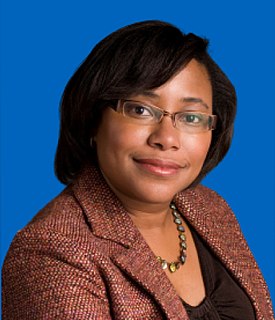
Paula Therese Hammond is a David H. Koch Professor in Engineering and the Head of the Department of Chemical Engineering at the Massachusetts Institute of Technology (MIT). She was the first woman and person of color appointed as head of the Chemical Engineering department. Her laboratory designs polymers and nanoparticles for drug delivery and energy-related applications including batteries and fuel cells.
Klavs Flemming Jensen is a chemical engineer who is currently the Warren K. Lewis Professor at the Massachusetts Institute of Technology (MIT).
Michael J. Cima is an American materials scientist and engineer and the David H. Koch Professor at Massachusetts Institute of Technology
Francis "Frank" J. Doyle III is the dean of the Harvard John A. Paulson School of Engineering and Applied Sciences and the John A. and Elizabeth S. Armstrong Professor of Engineering and Applied Sciences. He is also affiliated with the Division of Sleep Medicine of Harvard Medical School.
References
- ↑ "About". mit.edu. Retrieved May 3, 2017.
- ↑ "Robert Cohen lab". mit.edu. Retrieved May 3, 2017.
- ↑ "Robert Cohen". hopkinsmedicine.org. Retrieved May 3, 2017.